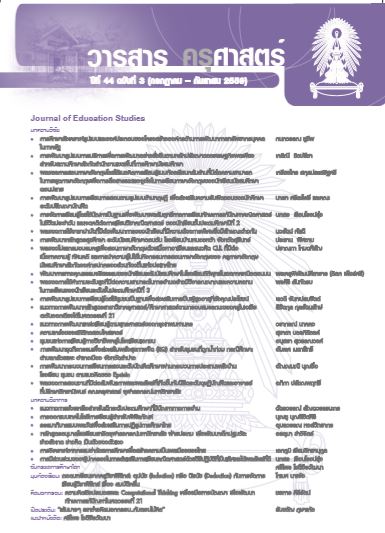การพัฒนารูปแบบการเรียนการสอนตามรูปแบบข้ามทฤษฎี เพื่อส่งเสริมความรับผิดชอบของนักศึกษาระดับปริญญาบัณฑิตDevelopment of an Instructional Model Based on the Transtheoretical Model to Enhance Responsibility of Undergraduate Students
Keywords:
รูปแบบการเรียนการสอน, รูปแบบข้ามทฤษฎี, ความรับผิดชอบ, นักศึกษาระดับปริญญาบัณฑิต, INSTRUCTIONAL MODEL, TRANSTHEORETICAL MODEL, RESPONSIBILITY, UNDERGRADUATE STUDENTSAbstract
การวิจัยครั้งนี้มีวัตถุประสงค์ 2 ประการ คือ 1. พัฒนารูปแบบการเรียนการสอนตามรูปแบบข้ามทฤษฎี เพื่อส่งเสริมความรับผิดชอบของนักศึกษาระดับปริญญาบัณฑิต 2. ศึกษาผลการใช้รูปแบบการเรียน การสอนตามรูปแบบข้ามทฤษฎี เพื่อส่งเสริมความรับผิดชอบของนักศึกษาระดับปริญญาบัณฑิต โดยการศึกษาผลการใช้รูปแบบการเรียนการสอนแยกออกเป็น 2 ประเด็น คือ เปรียบเทียบความรับผิดชอบของนักศึกษาระดับปริญญาบัณฑิตก่อนและหลังการใช้รูปแบบการเรียนการสอน และศึกษาการเปลี่ยนแปลงพฤติกรรมความรับผิดชอบของนักศึกษาระดับปริญญาบัณฑิตที่มีพื้นฐานระดับความรับผิดชอบแตกต่างกัน กลุ่มตัวอย่างที่ใช้ในการทดลอง คือ นักศึกษามหาวิทยาลัยเกษมบัณฑิต ที่ลงทะเบียนเรียนในหลักสูตรรายวิชา ศท. 126 กระบวนการกลุ่มและเทคนิคการทำงานเป็นทีม ภาคการศึกษาที่ 1/2557 ที่เลือกแบบเจาะจง จำนวน 31 คน เครื่องมือที่ใช้ในการเก็บรวบรวมข้อมูล ประกอบด้วย แบบสอบถามพฤติกรรมความรับผิดชอบ แบบรายงานพฤติกรรมความรับผิดชอบ แบบสังเกตพฤติกรรมความรับผิดชอบ และแบบสัมภาษณ์พฤติกรรมความรับผิดชอบ
ผลการวิจัยพบว่า
1. รูปแบบการเรียนการสอนตามรูปแบบข้ามทฤษฎี เพื่อส่งเสริมความรับผิดชอบของนักศึกษาระดับปริญญาบัณฑิตที่พัฒนาขึ้นมีทั้งหมด 6 ขั้นตอน คือ ขั้นกระตุ้นความคิด ขั้นพิจารณาบทบาท หน้าที่ ขั้นสร้างการมีส่วนร่วม ขั้นแสดงผลรวมความรู้ ขั้นก้าวสู่การพัฒนา และขั้นประเมินค่าการเปลี่ยนแปลง
2. ภาพรวมค่าเฉลี่ยการแสดงพฤติกรรมความรับผิดชอบต่อตนเองในด้านการเรียน ต่ออาจารย์ และต่อเพื่อนของนักศึกษาหลังการทดลองสูงกว่าก่อนการทดลองอย่างมีนัยสำคัญทางสถิติที่ระดับ .05
3. กลุ่มตัวอย่างที่มีพื้นฐานระดับความรับผิดชอบสูง มีค่าเฉลี่ยการแสดงพฤติกรรมความรับผิดชอบต่อตนเองในด้านการเรียน ต่ออาจารย์ และต่อเพื่อน หลังการทดลองไม่แตกต่างจากก่อนการทดลอง
4. กลุ่มตัวอย่างที่มีพื้นฐานระดับความรับผิดชอบต่ำ มีค่าเฉลี่ยการแสดงพฤติกรรมความรับผิดชอบต่อตนเองในด้านการเรียน ต่ออาจารย์ และต่อเพื่อน หลังการทดลองสูงกว่าก่อนการทดลองอย่างมีนัยสำคัญทางสถิติที่ระดับ .05
The two objectives of this dissertation were firstly, to develop an Instructional Model Based on the Transtheoretical Model to Enhance Responsibility of Undergraduate Students, and second, to study the usage result of an instructional model based on the transtheoretical model to enhance the responsibility of undergraduate students. The study on the usage result is divided into two topics. Firstly, compare the responsibility of all samples before and after use of an instructional model. Second, the variance of responsible behavior of undergraduate students who have basic responsibility varies. The purposive samples used in the experiment were Kasembundit University’s students who were enrolled in the course GE.126 Group Process and Team Working Techniques in Semester 2/2557 totaling 31 persons. The research instruments consisted of a questionnaire for collecting data regarding students’ responsibility behaviors, a report of students’ responsibility behaviors, an observation form for responsibility behaviors and an interview form.
The research finding revealed that:
1. An instructional model based on the transtheoretical model to enhance the responsibility of undergraduate students has 6 steps as follows: the thought-provoking step, considering the role step, constructing participation step, the knowledge display step, forward development step and the valuation changes step.
2. The overall difference of the behavior responsibility behavior post-test scores for their own learning between the instructor and the peers between the pre-test scores were at the .05 level.
3. For undergraduate students with a higher level of responsibility, the post-test scores for their own learning, for the instructor and for the peers were not significantly different from the pre-test scores.
4. For undergraduate students with a low level of responsibility, the post-test scores for their own learning, for the instructor and for the peers were significantly different from the pre-test scores at the .05 level.




